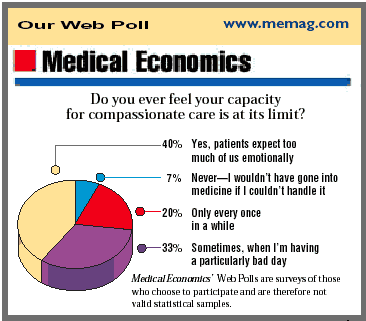Article
UPDATE: Focus on practice
Health costs; peer review; steroids
UPDATE
Focus on Practice
By Joan R. Rose
Affordable health care eludes even the biggest buyers
In May, the California Public Employees' Retirement System (CalPERS)the nation's third largest health care purchaserdecided to seek long-term relationships with insurers rather than put its health benefits program up for bid each year. CalPERS signed multiyear contracts with just two insurersBlue Shield of California and Kaiser Permanentebut the strategy has helped slow premium increases.
While premiums are still expected to rise 17 to 18 percent in 2004, that's substantially lower than this year's overall increase of more than 25 percent and the 31 percent the two insurers originally sought for next year. Nevertheless, CalPERS board president Sean Harrigan warns that no "purchasereven one the size of CalPERSwill be able to keep cost increases at bay and the quality of care affordable," unless the nation's health care system is overhauled.
Removing the secrecy from Medicare peer review
Medicare patients who complain about their physicians have the right to know what government investigators find out, a federal appeals court has ruled. Until now, even when the doctor was found to be at fault, the government kept the results secret unless the doctor involved agreed to the disclosure.
The suit, brought by the consumer advocacy group Public Citizen, involved a Kentucky Medicare patient who died from cancer of the cecum. A peer review panel investigated three physicians involved in the patient's care, exonerating one but offering no comment on the outcome of their investigations into the other two. Instead, the reviewers noted that they were prohibited from releasing any specific informationand promised that if a problem were found, they would take action.
HHS argued that secrecy is necessary if PROs are to adequately perform their duty. The appeals court agreed with a previous court that the PRO is required "to notify the complainant of the results of its review."
Are "boutique" practices on a collision course with Congress?
The AMA House of Delegates gave its approval to "boutique" medicine, but doctors who practice it could face a showdown with Uncle Sam. Rep. Benjamin L. Cardin (D-MD) has introduced legislation that would prohibit such doctors from billing Medicare. Cardin contends that physicians who practice boutique medicine are trying to circumvent Medicare's billing limits.
No reform is costly too
As demand for health care reform intensifies, political discussion inevitably turns to how much reform would cost. But the National Coalition on Health Care believes that inaction may be even more costly in the long run. In a recent report, the NCHC predicted that, without reform, the average annual premium for employer-sponsored family health coverage will surge to $14,545 in 2006more than double the 2001 average and more than $5,000 higher than this year's estimated $9,160. That will make it more difficult for businesses to continue to provide health coverage. Consumers will also find it more difficult to pay their share.
Consequently, as many as 53.7 million Americans could go uninsured in 2006.
The AMA tackles steroids
The AMA is recommending a ban on the sale of over-the-counter dietary supplements that contain anabolic steroids and their precursors. Teenagers use these productswhich are widely availableto boost athletic prowess.
National surveys indicate that steroid use is increasing in high school students, especially among girls. Side effects can include infertility, potentially irreversible masculine traits in females and breast enlargement in males, as well as liver, cardiovascular, and psychiatric symptoms.
Our Web poll

Joan Rose. UPDATE: Focus on practice. Medical Economics Aug. 8, 2003;80:10.





